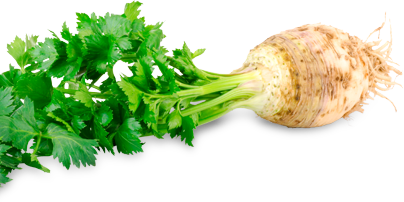|
Celeriac is very low in calories. 100 g root holds just 42 calories, quite higher than that of leaf-celery. Its smooth flesh has some health benefiting plant-nutrients, minerals, vitamins, and dietary fibre.
As that in carrot and other members of Apiaceae family vegetables, celeriac too contains many poly-acetylene anti-oxidants such as falcarinol, falcarindiol, panaxydiol, and methyl-falcarindiol.
Several research studies from scientists at University of Newcastle at Tyne found that these compounds possess anti-cancer properties and, thereby, may offer protection from colon cancer and acute lymphoblastic leukaemia (ALL).
Celeriac is very good source of vitamin K. 100 g root provides about 41 µg or 34% of recommended daily intake. Vitamin-K improve bone mineralization by promoting osteotrophic activity in the bones. Research studies suggest that it also has established role in Alzheimer's disease patients by limiting neuronal damage in the brain.
The root is a very good source of some of the essential minerals such as phosphorus, iron, calcium, copper, and manganese. Phosphorus is required for cell metabolism, maintaining blood buffer system, bone and teeth formation. Copper helps restore immunity, prevents anaemia, and required for bone metabolism.
Further, it contains some of valuable B-complex vitamins such as pyridoxine, pantothenic acid, niacin, riboflavin, and thiamin. Fresh root also provides moderate amounts of vitamin C (8 mg/100 g).
Celeriac is low in calories : Celeriac is very low in calories. 100 grams of the root hold just 42 calories. This low-calorie nutritionally dense food is perfect for weight loss.
Help improve bone strength: One cup of celeriac (156 grams) contains 64 micrograms of vitamin K or 80 percent of the daily recommended needs. Sufficient vitamin K consumption acts as a modifier of bone matrix proteins, improves calcium absorption, preventing bone loss and osteoporosis.
Improve brain function: Vitamin K is essential for the production of sphingolipids, the myelin sheath around nerves. Myelin sheaths are vital for the proper conduction of nerve cells. Research studies suggest that it also has established a role in Alzheimer's disease patients by limiting neuronal damage in the brain.
Contains many antioxidants:Members of Apiaceae family vegetables like celeriac contains many antioxidants such as falcarinol, falcarindiol, panaxydiol, and methyl-falcarindiol. Antioxidants find and eliminate cell-damaging free radicals that can turn healthy cells into cancer cells.
Help maintain a healthy blood pressure: Celeriac has a very high content of potassium and a low content of sodium, which may help reduce the risk for hypertension. One cup of celeriac contains 468 milligrams of potassium, compared to 156 milligrams of sodium.
A good source of manganese: Manganese is an essential metal for human health, being absolutely necessary for development, metabolism, and the antioxidant system. One cup of celeriac contains 12 percent of the daily recommend values of manganese.
Help fight off cancer: Celeriac is an excellent source of Vitamin C. One cup of celeriac can give 21 percent of the daily requirement of Vitamin C. This acts as an antioxidant to remove toxins from the body and detoxifies it. Vitamin C can destroy free radicals that turn healthy cells into cancerous cells.
|

